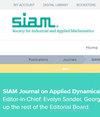经典摆的快速退化扰动的分离矩分裂
IF 1.8
4区 数学
Q2 MATHEMATICS, APPLIED
引用次数: 0
摘要
SIAM 应用动力系统学报,第 23 卷,第 2 期,第 1159-1198 页,2024 年 6 月。 摘要.在这项工作中,我们研究了具有[math]个[math]周期函数和[math]的快速扰动摆[math]的分裂距离。当[math]时,已知梅尔尼科夫函数实际上给出了[math]所提供的分裂函数的渐近表达式。我们的研究侧重于[math]的情况,其动机主要有两个。一方面,我们的研究是出于对分裂的一般理解,因为目前的结果对于像[math]这样简单的扰动是失败的。另一方面,在阿诺德最初的扩散模型中,对有理频率[math]的环的不变流形分裂的研究导致了对具有[math]的钟摆式哈密顿的考虑,在大多数[math]情况下,扰动满足[math]。不出所料,在这种情况下,梅利尼科夫函数并不是一个正确的分裂近似值。为了解决这个问题,我们使用了基于所谓内方程解的分裂公式,并利用了汉密尔顿-雅可比形式主义。前导指数小项出现在[math]阶,其中[math]是一个整数,完全由扰动的谐波决定。我们还提供了计算它的算法。本文章由计算机程序翻译,如有差异,请以英文原文为准。
Splitting of Separatrices for Rapid Degenerate Perturbations of the Classical Pendulum
SIAM Journal on Applied Dynamical Systems, Volume 23, Issue 2, Page 1159-1198, June 2024.
Abstract.In this work we study the splitting distance of a rapidly perturbed pendulum [math] with [math] a [math]-periodic function and [math]. Systems of this kind undergo exponentially small splitting, and, when [math], it is known that the Melnikov function actually gives an asymptotic expression for the splitting function provided [math]. Our study focuses on the case [math], and it is motivated by two main reasons. On the one hand, our study is motivated by the general understanding of the splitting, as current results fail for a perturbation as simple as [math]. On the other hand, a study of the splitting of invariant manifolds of tori of rational frequency [math] in Arnold’s original model for diffusion leads to the consideration of pendulum-like Hamiltonians with [math] where, for most [math], the perturbation satisfies [math]. As expected, the Melnikov function is not a correct approximation for the splitting in this case. To tackle the problem we use a splitting formula based on the solutions of the so-called inner equation and make use of the Hamilton–Jacobi formalism. The leading exponentially small term appears at order [math], where [math] is an integer determined exclusively by the harmonics of the perturbation. We also provide an algorithm to compute it.
Abstract.In this work we study the splitting distance of a rapidly perturbed pendulum [math] with [math] a [math]-periodic function and [math]. Systems of this kind undergo exponentially small splitting, and, when [math], it is known that the Melnikov function actually gives an asymptotic expression for the splitting function provided [math]. Our study focuses on the case [math], and it is motivated by two main reasons. On the one hand, our study is motivated by the general understanding of the splitting, as current results fail for a perturbation as simple as [math]. On the other hand, a study of the splitting of invariant manifolds of tori of rational frequency [math] in Arnold’s original model for diffusion leads to the consideration of pendulum-like Hamiltonians with [math] where, for most [math], the perturbation satisfies [math]. As expected, the Melnikov function is not a correct approximation for the splitting in this case. To tackle the problem we use a splitting formula based on the solutions of the so-called inner equation and make use of the Hamilton–Jacobi formalism. The leading exponentially small term appears at order [math], where [math] is an integer determined exclusively by the harmonics of the perturbation. We also provide an algorithm to compute it.
求助全文
通过发布文献求助,成功后即可免费获取论文全文。
去求助
来源期刊

SIAM Journal on Applied Dynamical Systems
物理-物理:数学物理
CiteScore
3.60
自引率
4.80%
发文量
74
审稿时长
6 months
期刊介绍:
SIAM Journal on Applied Dynamical Systems (SIADS) publishes research articles on the mathematical analysis and modeling of dynamical systems and its application to the physical, engineering, life, and social sciences. SIADS is published in electronic format only.
 求助内容:
求助内容: 应助结果提醒方式:
应助结果提醒方式:


